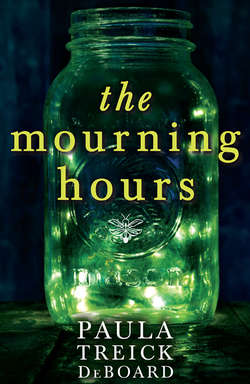Читать книгу The Mourning Hours - Paula DeBoard Treick - Страница 6
Оглавлениеprologue
October 2011
Just outside Milwaukee, I saw the lights behind me—Wisconsin Highway Patrol—and pulled over to the shoulder.
Even before the cop tapped on the window, I started fumbling in the shoulder bag I had been lugging around since that morning, since San Francisco. I had packed in a hurry—my cell phone, a tube of lip gloss, a stack of undergrad papers to be graded, a dog-eared copy of US Weekly.
While I searched for the power window button, I caught a glimpse of myself in the glass: wrinkled clothes, grease forming at my hairline, mascara from twelve hours ago smudged under my eyes like twin bruises.
“I know, I was speeding,” I said, even before the window came to a stop. The night was cold—was it really almost winter in the Midwest? I had been living in a mild haze of seasonless fog, and this chill nipped straight through my T-shirt. It was as if I had spent years walking on a treadmill and was just now finding my real footing.
“License and registration,” said the cop, an automaton. I peered out the window at him, but his face was hidden in a pocket of darkness, only his badge winking back at me, his stiff jacket collar standing at attention. From his waist, a radio crackled.
“I just rented this car at the airport,” I said, producing the plastic pouch from Hertz, full of shiny brochures and a contract that unfolded like a fan to reveal my sleep-deprived scrawl at the bottom. It could have been anyone’s signature, really.
He scrutinized the contract with his flashlight, more carefully than I’d studied it at the airport with a line of twenty people shifting behind me. I suddenly worried that with this, like most things in my life, I hadn’t taken the time to read the small print, to look for loopholes.
“Your license?” he asked.
“Yes, my license...” I dug in my shoulder bag for my wallet, where an empty space gaped at me from behind a plastic window. Credit cards, my Berkeley ID, a Starbucks gift card with a grand balance of fifty-seven cents. I could feel the cop’s eyes on me. To speed up the search, I turned my shoulder bag upside down. A dozen pens, the wad of Kleenex I’d cried into on the plane, a Life Saver clinging to a bit of aluminum foil—but no license. I started babbling away like a psychotic on a weekend pass. “I’m so sorry, officer. I’m usually a very cautious driver. But my flight got in late, and I was anxious to get going and there’s almost no one on the road....”
In the midst of my rambling, my right hand brushed against the ID carrier still looped around my neck. “Oh! Here it is!” Thank God. I’d been about to throw myself on the mercy of the Wisconsin justice system, which had never impressed me. Instead I handed it over, the driver’s license that expired on my next birthday: my tentative smile, the vital statistics I had improved upon slightly, adding an inch, subtracting ten pounds.
“California, huh?” he said. “I bet it’s a bit colder here.”
I laughed with relief, playing along. Everyone in California lives in L.A., after all. We’re all sun-bleached blondes who load our kids into shiny SUVs and cart them off to surf camp.
“They might drive faster there, too,” he said. “I clocked you going twelve over.”
“I’m sorry,” I repeated, twisting the hem of my T-shirt.
He ignored me and tapped something into the keypad of the radio receiver. The license plate—to see if it would come back stolen? My name to check for warrants or a skipped court date, a charge or possession or prostitution or burglary?
My name. I stiffened, a reflex for someone who has heard her name on the news, enunciated carefully by well-coifed reporters. I worried that the cop might feel my nerves, the way a dog can sniff out the presence of a cat. In California my name didn’t matter; it didn’t ring any bells the way it might here. The officer was old enough to remember the case, the name Hammarstrom on the front page of every Wisconsin paper.
He handed back the Hertz packet with my license balanced on top. As he leaned into the window, his face was visible—pale, mustached, his forehead topped by a receding brown hairline. “So, where are you headed?”
My eyes drifted back to the road. Highway 43 would take me past Port Washington, Oostburg, Sheboygan. Before Manitowoc, I would branch off onto 151, taking the various twists and turns through the country roads that would bring me to Watankee, to Rural Route 4, to the gravel driveway and the light over the back porch.
Except it would all be different now, since he wouldn’t be there to greet me.
Suddenly I felt the pull of the place, like the insistent tug of a magnet buried deep down, beneath the asphalt. It was something I had never been able to properly explain to my Cultural Geography undergrads, maybe because I’d never been able to explain it to myself. A sense of place. I smiled at the cop, at this stranger leaning in through the crisp evening air. Somewhere deep inside, where I’d been clutching my childhood in a tight invisible fist, I felt myself slowly releasing, releasing. Let it go, Kirsten. Let it go.
“Home,” I said, swallowing hard. At that moment it felt like the only truth, the deepest possible truth of them all. “I’m going home.”
